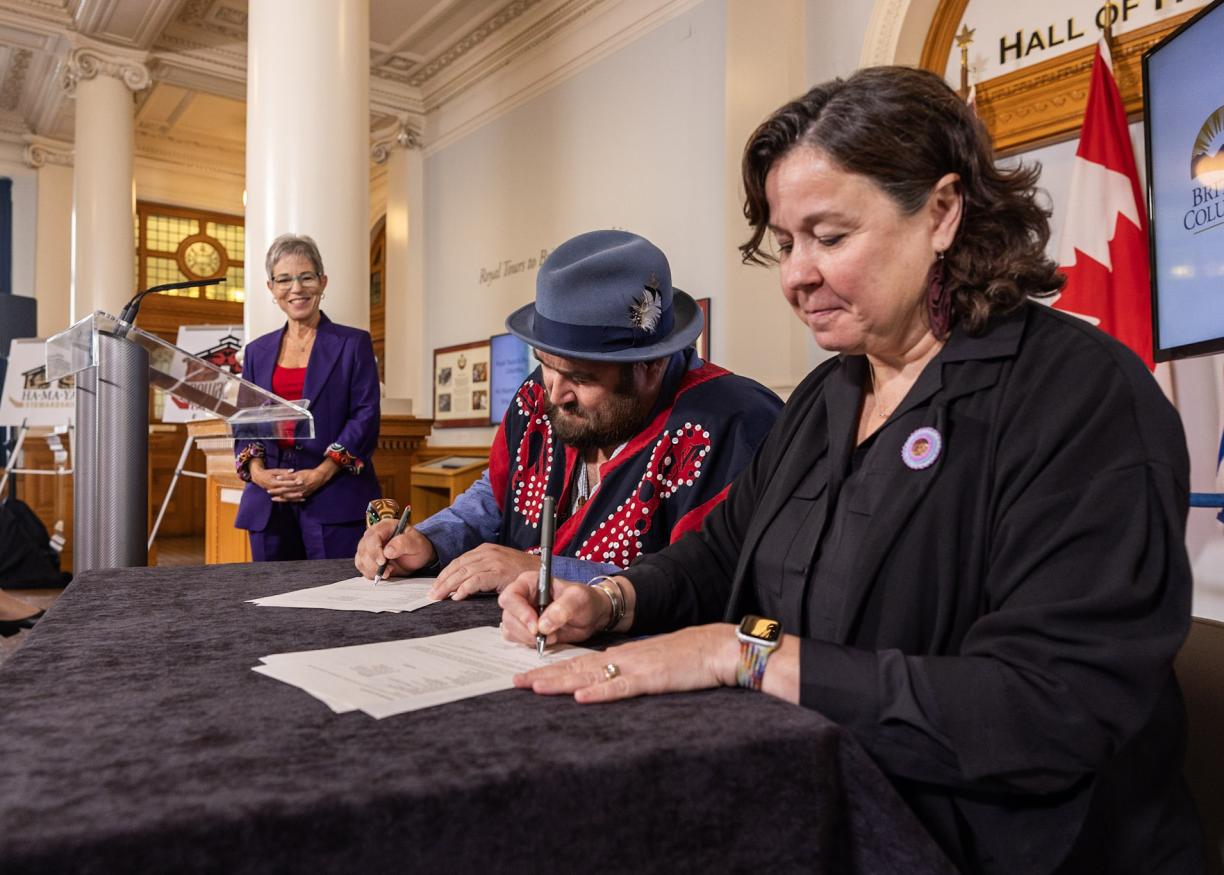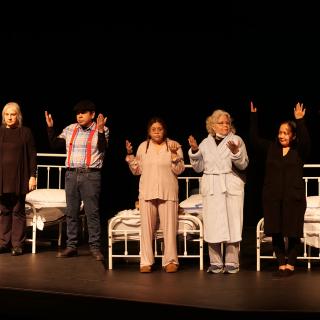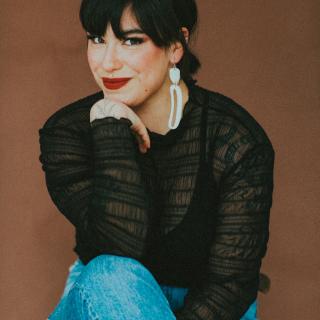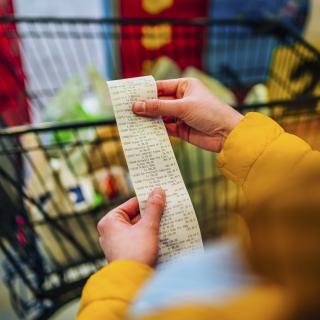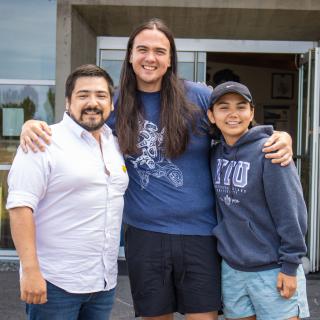VIU President and Vice-Chancellor Dr. Deborah Saucier and Dallas Smith, Nanwakolas Council President, sign the agreement while Selina Robinson, Minister of Post-Secondary Education and Future Skills, looks on. Article reprinted courtesy of Nanwakolas Council.
Partnership between Nanwakolas Council nations and Vancouver Island University
addresses urgent need for more Indigenous Guardians across BC
VICTORIA, B.C. (Oct. 4, 2023) - An agreement signed today by Nanwakolas Council and Vancouver Island University (VIU) and supported with funding from the Ministry of Post-Secondary Education and Future Skills, will provide new Indigenous Guardians with the skills they need to protect the fragile lands and waters of Vancouver Island and the central BC coast.
Indigenous Guardians play a vital role in emergency first response and protecting fragile BC ecosystems from harmful human activity and the increasingly serious effects of climate change. The agreement and funding will support an intensive VIU Stewardship Technician Training Program (STTP) to train new Guardians. The program begins in Campbell River in October.
“The Nanwakolas member Nations are taking on increased responsibilities for environmental governance and management as we exercise our Rights and Title in the territories,” says Nanwakolas Council President Dallas Smith. “That means we need many more Guardians actively engaged in monitoring forestry harvesting, hunting, protection of cultural sites, gathering data on key species, rehabilitation of damaged habitat, assessing resource development proposals, and ensuring compliance with land use plans and regulations. We need Guardian capacity to respond to crises like the sinking of barges and tugs carrying oil and other toxic pollutants, as happened recently in Chancellor Channel. Having stable, well-funded training programs in place like the STTP to support that exponential increase in capacity will serve to benefit everyone on the coast.”
“Vancouver Island University is immensely proud of our long-standing partnership with Nanwakolas Council to collaboratively deliver the STTP and related initiatives,” says VIU President and Vice-Chancellor Dr. Deborah Saucier. “The partnerships between VIU and Indigenous communities that support learners, co-create innovative programming and deepen mutual understanding are core to VIU’s identity. We see ourselves as a university built by and for our community. The signing of this agreement speaks to our commitment to reconciliation and the value of working together to advance culturally appropriate education and relational land-based learning.”
“I’d like to acknowledge the support of the provincial Ministry of Post-Secondary Education and Future Skills in helping us to deliver the STTP,” added Smith. “The ministry’s continued support aligns with our vision and the urgent need for training and education for our people. It also aligns well with the United Nations Declaration on the Rights of Indigenous Peoples and BC’s DRIPA legislation and Action Plan and the responsibilities those important initiatives place on First Nations, as well as governments.”
“Investing in Indigenous-led skills training plays a critical role in reconciliation,” said Selina Robinson, Minister of Post-Secondary Education and Future Skills. “Through significant investments and Indigenous-led partnerships, together we are creating a path forward towards economic opportunities and meaningful work where Indigenous people can gain new skills and serve their communities.”
The best kind of investment
The benefits of every dollar put into Guardian programs are phenomenal, say Smith and Saucier. That includes economic opportunities created by the programs, deeply meaningful employment for citizens of the Nations, significant improvements to the environmental wellbeing of the territories and the enhancement of the cultural, health and community wellbeing within each Nation. The Guardian programs also enhance Indigenous capacity and governance capability as First Nations are empowered to make decisions based on high-quality data gathered by their Guardians in the territories.
“Research has demonstrated that for every dollar invested in the work of First Nations land and water Guardians, including those in the Nanwakolas Council member First Nations’ Ha-ma-yas Stewardship Network, that there is at minimum a 10-fold return,” says Smith. “The investment that our partners at VIU have made in codeveloping a training program with us is absolutely invaluable, especially for our young Indigenous men and women who are on waiting lists to take the STTP and gain the skills and qualifications they need to work as Guardians.”
What the STTP means to Indigenous students
Past students cannot say enough about the importance of the STTP, and the Indigenous-led, culturally safe delivery of the program. Students range in age from 18 to 58 and all carry the burden of colonial trauma with them in some way. The STTP empowers them for a future of possibility, not only as Guardians, but to go on to additional education to become qualified scientific and technical professionals in forestry, biology, archaeology, environmental management, and other similar fields.
“The STTP program is something I’ll be able to build on for my whole life,” reflects Cory Frank, who graduated in 2017 in the first cohort of students and is now the Guardian Manager of the K’ómoks First Nation. “I encourage everyone to take all the courses. I tell them, take everything! You’ll never regret it.”
“The program allows students to build our own pathways, and our own very personal and deep definition of what being a Guardian means to us,” says Angela Davidson, a 2018 STTP graduate. Christina Speck-Green, a 2021 STTP graduate, agrees: “I was encouraged to be myself without any hesitation and felt appreciated. That was a first for me in a learning experience. I never enjoyed education nearly that much in the past.”
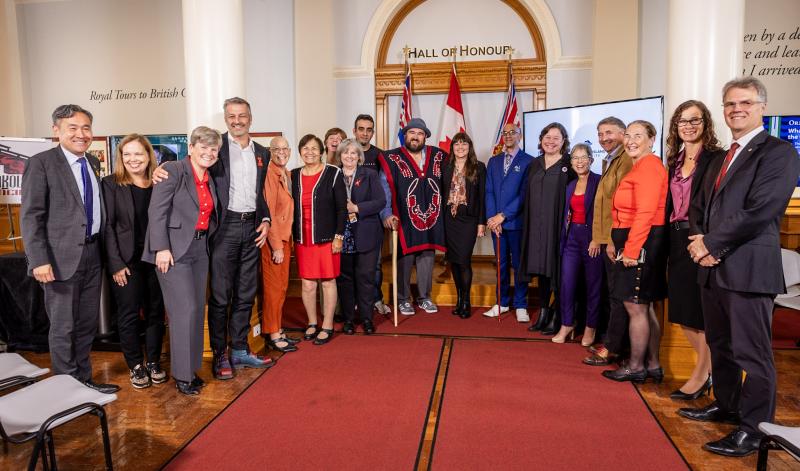
About the VIU First Nations Stewardship Technicians Training Program
About Nanwakolas:
The Nanwakolas Council is comprised of six member First Nations whose traditional territories are located in the Northern Vancouver Island and adjacent South Central Coast areas of British Columbia (Mamalilikulla, Tlowitsis, Da’naxda’xw Awaetlala, We Wai Kai, Wei Wai Kum and K’ómoks). The Council supports the work of First Nations’ Guardians through the Ha-ma-yas Stewardship Network. For more information, visit www.nanwakolas.com
To access downloadable photos, videos and brochures about the Nanwakolas Guardian programs and the STTP, please visit https://drive.google.com/drive/folders/1YBihS9iuXNCqMoZbx0kAD__OXkSz-8JC?usp=drive_link
Vancouver Island University
Vancouver Island University is a Canadian postsecondary institution located on Vancouver Island with three campuses, the main campus is in Nanaimo, with regional campuses in Duncan and Powell River and a campus centre in Parksville. For more information, visit https://www.viu.ca/programs/program-areas
Province of B.C. BC Future Ready Action Plan
https://news.gov.bc.ca/releases/2023PSFS0023-000637
-30-
Media contacts:
Nanwakolas Council
Katherine Gordon, 250-616-6031, ksagordon@gmail.com
Vancouver Island University
Jenn McGarrigle, External Communications Manager, 250-619-6860, Jenn.McGarrigle@viu.ca
Province of BC
Media Relations, 604-209-7629

